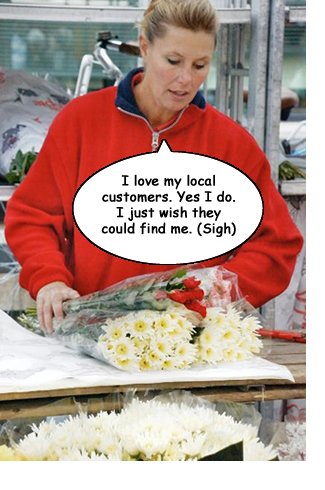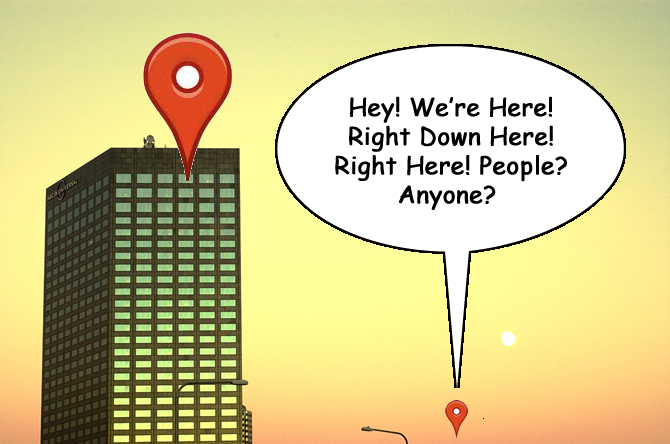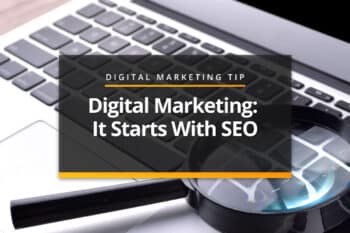When you need a local service, what’s your first course of action? Most people these days would say that they hop on their computer and “Google” what they’re looking for. If you’re “on the go” you’ll likely do a search using a mobile app such as Apple or Google Maps, Yelp, YP.com, or any number of other online or app resources that return local business information and reviews.
Computers, smartphones, and more recently, tablets have completely revolutionized how we locate and discover local information. It has been said that there are over 10 billion searches performed on a monthly basis and that number has been growing exponentially. Of that number, 20% of all computer searches are locally focused* and over 50% of mobile searches have local intent**. (*Comscore/Google, **Microsoft, Original quote source: GetListed.org)
Here’s the big one: Almost half of all local searches begin without a specific business in mind. That means that people are simply looking for a product or service and they’re looking for help online. This is where the opportunity lies for locally-focused small businesses that are pursuing an ongoing SEO strategy.
Newsflash: Your customers use the internet when they need to find something in your local region!
Small businesses need to immediately and completely embrace this statement or be prepared to die. It’s that simple.

It’s about expanding your reach and positioning your business online where customers are actively looking.

The big takeaway is that you need to get behind the fact that there are billions of people searching for and engaging with LOCAL businesses when they need food, entertainment, products and services online and that number is growing every month.
You need to be there in a big way and that involves much more than setting up a website. How do you get the job done? Well, the specifics on how you successfully navigate all aspects of local search engine optimization is a subject for later discussions. First, you need to fully understand WHY an active local search engine optimization campaign is of utmost importance for your organization and then we’ll touch a little bit on “how” as we work our way forward.
1) Understanding Local Intent – Search engines are getting REALLY good
Search engines have recently made a big shift toward local search results which will obviously favor small businesses that want to reach a local audience. This is the number one reason why you as a small business owner or marketer should be concerned with and actively pursuing a local search engine optimization strategy.
You see, in the past, if you typed a general search phrase into Google without a local modifier (city, state, suburb, zip code) you could get a mix of technical information related to the topic or popular national companies with a large footprint online. Search results like this are completely useless to people who intend to find something local. Google was good at returning results related to a specific search query, but they weren’t so good at knowing whether someone was seeking something locally and they’ve realized their error.
With Google’s recent changes, they’re now getting very good at understanding what’s called local intent and prominently positioning local businesses within their search results. Their algorithms now know when someone types “home builder” or “heating contractor” they’re usually not looking to change their career, research the industry stats or connect with the country’s largest manufacturer 3 states away. They’re looking for a local service provider in their area — likely within a fairly tight radius.
This fact is paramount when marketing a business locally online: Search results are becoming more localized and it’s a huge opportunity for local small businesses. The important thing to know is that you must perform specific tasks to show up within the local search results. Again, just building a website won’t get you there. You must aggressively perform very specific tactics over time to beat out the competition and get Google to show you as a resource within the search results. Again, another reason why you should consider seeking the advice of a professional local search engine optimization company to guide you — or better yet — handle your internet marketing strategy so you can focus on running your business.
2) Mobile smartphones, tablets and internet-connected gadgets are a BIG deal!
The second reason why local search engine optimization is important: 50% of searches on mobile devices have local intent and that number is growing monthly. That is a big statement. How bout this one? Morgan Stanley states that by 2015, the total number of mobile users browsing the Internet on a mobile device will go above and beyond desktop/laptop usage. Whoa.

As we’ll discuss in the following paragraphs, there are many reasons to get intimate with local mobile users including the social interaction through sites like Facebook, the growth of video usage, and the ever-growing plethora of ways to advertise to mobile users specifically.
So, what’s the answer when it comes to mobile? Again, we’re not going to go too deep into tactics at this point, but the first step is to make sure that your business name, address, phone number, and web address are consistent and distributed widely. (See section below about business data distribution) But that doesn’t have anything to do with my website you say? Yes, that’s correct.
Here’s an example. Have you ever typed a business name as your destination within a GPS device or mapping site and received the dreaded “No results found”? This is because the business has not effectively distributed its NAP. (Name, Address, and Phone) This can be accomplished through a combination of manual submissions and distribution through the top U.S. data distributors as we’ll discuss.

From there, your options can expand infinitely. You should obviously develop a mobile-optimized website that effectively presents visitors with the most important information and allows them to navigate and interact with your content on a small device — always a good idea. You can explore the world of mobile paid advertising. Google has said that Mobile is no longer an add-on to a campaign. In 2013, 48% of marketers plan to increase engagement in mobile advertising. 41% plan to develop a mobile app which is a whole other direction that you can go. Social is huge on mobile too. How do you engage with these users? What direction will you go?
And don’t forget the old standby, email marketing. Mobile phones allow easy access to email and people are often engaging with companies via email on their smartphones. Google estimates that over 82% of smartphone users check and send an email with their devices. Forrester Research estimates that 78% of all U.S. email users will also access their emails via mobile by 2017. These are big numbers that should not be ignored.
3) Reviews – People want to know the dirt on your business. Local search results give them what they want to make an informed decision
One of the great things about the internet is the fact that anyone can contribute. Even if you don’t build a website around a topic, you can contribute to other websites and resources. One of the easiest ways is to leave comments, participate in forum discussions and offer reviews. With a click on the mouse, you can contribute to resources, influence, and inform. So small business owners should take notice in a big way.
Online reviews have become an essential resource. Consumers are now relying on the internet community and their peers to help them make decisions. Whether it’s about a product, a service, a restaurant, or a niche topic, people rely heavily on reviews and comments that appear on websites. Legit or not, online reviews make a huge impact and they can’t be ignored.
Why should you care about online reviews?
What you need to know if you’re a small business is that reviews influence consumers and every consumer has the ability and the right to contribute. You don’t have any control over when, where or how the reviews appear online either. So what can you do?
Honestly, the best thing to do is not to fight the tide. You simply can’t control online reviews so the best thing to do is focus on running a great company. The rest will take care of itself. You can consider hiring a company to engage with reputation management but for most small businesses it might not be possible.
But if we’re talking local search optimization, there’s actually a lot that you can do to contribute to the conversation and actually encourage customers and the community at large to leave reviews and comments about your business. It’s actually a good thing in many ways. Do not fear reviews!
- First, having reviews about your business appear online — especially good reviews — is obviously a good thing for your business. Do anything you can to encourage customers to leave their thoughts on relevant online resources.
- Next, online reviews on Google and other priority “citation” sites (more on that later) is a signal that Google uses to influence local search rankings. Good or bad, consistent online reviews on a broad range of websites can help you rank higher in the local search results above your competition. Consistent reviews over time is a signal that shows that you’re an active business as well so do what you can to steadily encourage reviews over time.
- Lastly, don’t fear online reviews. As stated, good or bad reviews are a good thing. It’s a great signal to the search engines that you’re a real, live company that’s still in business and engaged in the community. Beyond that, it’s an opportunity to engage with customers. Even if they’re upset, a response online shows that you care and that you’re actively engaged. Look at bad reviews and comments as an opportunity to engage and weave the story in your favor. Even if you end up giving the person an apology or even a refund, it’s a chance to document that exchange online where others can see that you’re an honest and fair company that cares. Even better, you might change the outlook of the consumer and they may even change their review in your favor!
Remember that online reviews are essential and important. Encourage them in any way possible and engage with your customers. Online reviews are not going away and customers will rely more and more on them in the future. If you ignore reviews in general, the customers just might move on to the next provider who actually has reviews.
If you’re interested in learning more about why online reviews are important and what you should do to encourage and grow your reviews, click the link for more information.
4) Citations – Local search is more than search engines
Everyone has heard of and likely used Google and other top search engines like Yahoo and Bing. Getting your website and subsequent pages listed prominently on the big boys is job #1.
But let me be the first to tell you, people actually use other websites to find information online. They use apps on their mobile phone. They use specialized websites, portals, directories, and niche resources. Consistent listings of your business on these secondary resources are critical and we call these listings citations.
A local citation is when someone has mentioned your business on a website. All it takes is the business name, address, and phone number and you have yourself a citation — and the more citations, the better.
Why Citations Matter
First, Google is getting better and better at monitoring and utilizing citations as a signal that influences local search and they don’t even need a link to your website anymore to make the match. The consistency of your business information is extremely important as is how complete and detailed the citations are. It all figures into the signals that Google receives about your business online.
Google can pull great amounts of information from any website or resource and that includes your business name, the category you’re listed in, and the related words from comments and reviews — just to mention a few. From this information, they can piece together what you do, what you sell, where you’re located, what people think about you, and even if you’re still in business.
Ultimately your citations send signals that Google uses to determine if you’re relevant. This is called lexical co-occurrence which is an ultra-geeky term that describes how words are associated with one another. It’s not a stretch to believe that Google can easily associate your business name with other words around it to determine relevancy. A simple example would be a listing of your business on the yellow pages within a certain directory. The listing only has your name, phone number and address but from that listing, Google can look at your name, what category you’re listed in, what people are saying about you in reviews and what all your competition is doing on their listings within that category. This simple listing returns a valuable signal to Google that they can actually use.
Second, As mentioned, people can actually find your local business on other websites. They might go directly to the website (Yelp.com, Facebook, etc.) or use an app on their mobile phone (YP.com, Urbanspoon, Mapquest, Scout). The options for consumer consumption are growing in leaps and bounds and even though Google is the 500-pound gorilla online, you shouldn’t neglect other websites and resources that consumers might use to find your business.
Lastly, citations are listings on other websites. These citations have been called “barnacles” and the practice of building citations has been called “barnacle SEO” because you’re essentially trying to attach yourself to a large, high-traffic website and just wait in the surf for people to find you. They can find you by going to the site directly but the likely scenario is that the website and/or category itself will show up for relevant searches within your area and you have a two-click conversion where customers click through to your website.
Citations are important and useful for several reasons as you can see. Building citations over time can be very important to building your local footprint online.
5) Business Data Distribution
Have you ever performed a search for a specific business or address on a GPS or App and you’re presented with the dreaded “No Results Found” message? Have you ever thought about why this is? I used to think that the GPS service just lacked in quality. Why can’t they get their act together!? But in reality, it’s more the business’s fault than the website or service.
The problem in this scenario is that the business hasn’t done anything to effectively distribute its business data online. You see, many of the websites, services, apps, and directories online don’t build their own databases from scratch. They either partner to get the data or purchase the data. That purchase usually comes from the top U.S. business data distributors who cultivate massive databases of business information and that’s what’s used when you type an address into your fancy little GPS device.
It’s important to realize that even the big data companies won’t necessarily find you. You must submit your business information to get listed and distributed correctly. Depending on the distributor and the number of locations that your business has there might be a small fee involved. (Currently anywhere between $50 and $400) per location and you’ll have to do all the work of compiling, optimizing, and submitting the information yourself.
Once you’re listed with the big data distributors good things start to happen. First, you’ll quickly start to build valuable citations as your data is widely distributed throughout the internet.
Second, the fact that your business information is distributed from a few central sources, it will likely be much more consistent which is good for your overall citation mojo. The consistency and volume of your citations is a very important signals that are used to rank local search results.
Lastly, it allows you to greatly expand your online footprint and increase the likelihood that people will find you either by visiting sites directly or finding you through your results showing up within search engine results.
The one thing that you can be sure of is that when someone is looking for your business using a GPS device, they’ll be able to find you and navigate to your location to make a purchase or engage you for services. This fact alone is worth the price of admission.
6) Social Media
The term social media usually causes a small business owner to react in a number of different ways. They might tilt their head and say “huh”? They might say that it’s child’s play, “Twitter is for kids with nothing better to do!” Or they might say that “I get it. But, I don’t have time for tweetin’, I’m running a business!.”
I get it. It’s one more thing that a small business owner has to think about and honestly, I get why people place the social aspects of marketing down at the bottom of their list — or not on the list at all. But I’m here to tell you, it’s important.
First, let’s confirm what “Social Media” is. For most people, it means Facebook and Twitter. But these popular services are only the beginning. Social Media is more than Tweeting random statements and links out to your followers. In fact, I’m not really a fan of the term “social media”. I prefer terms like Engagement Marketing, Social Engagement, Social Outreach and Social Marketing. It’s all about connecting, staying top-of-mind, and interacting with your customers and clients and there are many ways to do that beyond Facebook and Twitter.
What’s the key to success and how do I get started?
The key is understanding your options and then choosing the right fit for you. You might find that Twitter is a great outlet for your business. Do you own a cupcake or yogurt shop and have new varieties available on a daily basis? Customers might appreciate a daily reminder link to see what you have available. But, what if you’re an auto repair shop? People probably don’t want to hear from you on a daily basis. Maybe a monthly reminder to stop in for a tune-up or oil change with a coupon might be a good thing to post on Facebook.
The second key is to keep it simple. You must realize that you can’t effectively utilize every single social option and every new service that comes online. Choose an outlet that seems right and stick with it. If Facebook is your chosen tool, then stick with it and learn how to use it effectively. Engage on a regular basis and commit to making it work overtime. (And yes, it does take time so don’t give up!)
Beyond Facebook (Over a billion registered users) and Twitter (Over half a billion+) you should consider Google+ (Over half a billion+), LinkedIn (Hundreds of millions), and other geo-local services like Foursquare.
But when we’re re-positioning social media as “social engagement” there are other important options to consider when you’re trying to be “social” and “connect” with existing and potential customers:
- Blogging – Blogging is creating content. But it’s also an opportunity to build relationships, have discussions, provide valuable free advice, and build trust.
- Video – Many people forget about video as a social outlet. YouTube.com is currently the #3 site on the internet and there are a lot of opportunities to reach and communicate with new people.
- Forums – Niche or local forums can be huge for a small business owner. Consider engaging with 2-3 really good, highly relevant forums and engage with real people online. Provide free advice, build trust, and connect people to all of your other social outlets.
- Email – Don’t forget about email marketing. Email is a very effective medium to connect, inform, stay top-of-mind, and to spread the word about your business. Again, remember Google estimates that upwards of 82% of smartphone users check and send an email with their device so it’s a big opportunity to connect.
- Press Releases – Press releases aren’t exactly “social” but they are an opportunity to get the word out and connect with people and spread the word if you do it right.
- Online Events (Webinars and Teleseminars) – Offering free and valuable webinars and online events is a great way to connect with new customers and other small business owners, partners and friends. Nothing is more effective in building relationships than giving free advice and building from there.
Why being social online is important:
- It’s another opportunity to stand out and increase leads. The more you “touch” people, the more opportunities you have to convert them to customers.
- Partnerships. Connecting with people online can lead to valuable friendships and partnerships which inevitably turn into referrals.
- People expect it. These days customers expect to connect with businesses online. If they’re interested you should make the effort to be there.
- It’s an opportunity to stay top-of-mind. Social in all it’s forms is a huge opportunity to stay “top-of-mind” with your existing and potential customers.
- It’s another signal that search engines use. Consistently posting, linking, connecting and engaging on social media is a great signal that Google uses — probably in surprising ways. At the base level, an active social media account like Twitter, that’s associated with your business, shows that you’re still a viable and active business.
- Possible reduction in marketing costs. This one is a trade-off but social media can allow you to connect directly with customers in a way that doesn’t cost a dime. It does take time and effort. So if you’re willing to put in the time you can conserve valuable marketing dollars over time.
In Closing/Summary:
I’ve provided a lot of information here to digest and I’m sure many people didn’t even make it to the end. But if you did, hopefully, you’ve come away with a feeling that having a local search optimization strategy is important for small business owners and marketers. It’s definitely more involved than just putting up a website and making sure that it’s indexed by Google. The world of local optimization is an exciting place to explore and understand how it all works is becoming more and more important for anyone that wants to be found locally online.
Most Popular Articles

Seeing Favicons in Your Google Search Results? Here’s Why…
Have you noticed anything different in your Google Search results lately? Google added tiny favicon icons to its organic search results in January. It was…

Business Growth and Digital Marketing News & Tips 11-17-24
Are you encouraging and rewarding innovation? Lee Cockerell is the former Executive Vice President of Operations at Walt Disney World. A lover of traditional red…

Business Growth and Digital Marketing News & Tips 11-27-24
A culture of gratitude "Feeling gratitude and not expressing it is like wrapping a present and not giving it." – William Arthur Ward Beyond being…










